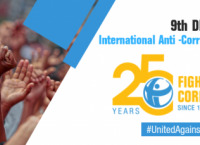
Statement on International Anticorruption Day
The source can be found here.
December 9 was declared by the UN General Assembly as International Anticorruption Day, and since 2003 it is marked in numerous countries worldwide.
In 2018 International Anticorruption Day coincided with the day of snap parliamentary elections in Armenia. It is symbolic that on that day for the first time in many years the people of the Republic of Armenia were given an opportunity to freely express their will and consequently their attitude toward political parties involved in corruption.
According to the findings of International Republican Institute nonprofit, nonpartisan organization’s survey, conducted on October 9-29 in Armenia, the vast majority (82%) of respondents viewed positively the recent change in government[1]. Equal percentage of respondents mentioned that fight against corruption was improved due to change in government.[2] Besides manifesting people’s satisfaction, these numbers imply that the majority of citizens have most serious expectations which should oblige the newly elected parliament and the government to make every effort to meet them. It is obvious that the higher public belief is and the more expectations the public has, the less tolerant might be citizens toward the government’s failures.
Citizens’ belief in the new authorities and their expectations have also been stipulated by the results of December 9 elections. It is important that the newly elected parliament and the newly appointed government immediately start to carry out the reforms in order to justify the votes cast by the citizens and to meet their expectations. As a primary step it is necessary that the following actions be taken:
Governance/electoral system
1. Initiate a process of constitutional amendments aimed at balancing powers among government branches, strengthening parliamentary oversight, as well as forming a proper system of human rights protection. As a priority, within the upcoming 3 years measures should be taken to solve the issues raised as a result of imposed, hasty and rigged 2015 December 6 referendum on RA Constitution. Constitutional reforms should be developed, and adopted through maximally transparent, participatory and public processes.
2. Commence a process to change and amend the Electoral Code and develop new Law on Political Parties according to concrete schedule and proper engagement of stakeholders. These constitutional laws should ensure accessible and transparent electoral processes, internal democracy of political parties, transparency of their activities and expenditures, and public accountability.
Good governance
3. Decisions on formation of the government and political appointments shall be based on public and comprehensible standards. Provide general principles for officials’ performance appraisals in order to ensure their responsibility, universality of their work styles, prevent spontaneous and discretionary behavior, as well as assist in performance appraisal. The scope of principles should involve: transparency of their activities, dialogue with public, cooperation with specialized public structures and experts, external relations, and accountability mechanisms. It is important that the government periodically carry out monitoring and evaluation to see how effectively its members implement their activities and sectoral programs.
4. In order to solve the problem of inflated state system and to promote effectiveness structural changes initiated by the government should be based on ensuring proper substantiation and transparency mechanisms. In order to mitigate the negative consequences of the reforms they should be accompanied with social and educational packages enabling the laid off employees to continue their adaptation to new conditions.
Fight against corruption
5. Parallel with currently prevalent law enforcement/punitive component of anticorruption policy pursued by the government of Armenia, corruption prevention measures should be stipulated, including corruption risk assessment, anticorruption education, prevention of conflict of interest in different sectors and monitoring. Anticorruption institutional model should be clarified based not only on profound and multidimensional study of international practice but also its reasonable country specification, taking into account the experience of the current anticorruption institutions, as well as the requirements based on the abovementioned political, economic, social and administrative reforms.
6. Establish one universal specialized law enforcement body. At present all law enforcement bodies without exception are involved in fight against corruption, performing different functions, however none of them has such a scope of jurisdiction to include pre-investigative and operative investigation functions, sufficient professional abilities, and is represented in all regions of Armenia to carry out full and proper law enforcement.
7. Develop anticorruption policy congruent with the above-mentioned reform agendas and roadmaps complementing them. In post-revolutionary context, given the plainly manifested political will, the fight against corruption should be holistic, carried out in all institutions and not incoherent as it was done formerly. It implies creation of a basis to ensure involvement of all the structures of Armenia, including central and local governments, as well as non-governmental organizations in the fight against corruption.
8. Transitional justice policy should be developed and carried out, in the scope of which, besides other issues corruption manifestations and impunity schemes widespread during former government should be studied, their assessment should be stipulated, and recommendations developed to return illegally acquired assets, to prevent the manifestations of political corruption in the future, and to render justice for the victims of corruption.
[1]https://www.iri.org/sites/default/files/2018.11.23_armenia_poll.pdf, page 4
[2]Ibid, page 30
